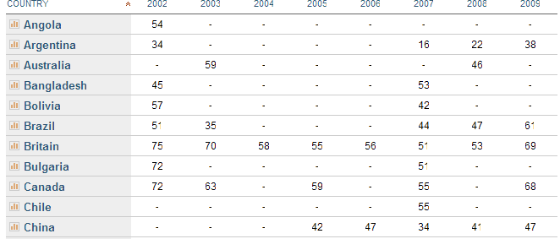While the focus of this blog is on race issue inside the U.S., I think it’s important to (1) recognize how such issues have globalized and transnational connections and (2) understand the state of race relations in other countries. With that second point in mind, the BBC News has an article about a new report on racial attitudes in Australia:
The study, titled “Challenging Racism: The Anti-Racism Research Project”, interviewed 12,500 people over almost a decade. A key finding was that while Australians in general are welcoming of diversity, the view of national identity remains narrow.
The group most often singled out as “not belonging” in Australia was Muslims or people from the Middle East, Professor Dunn told reporters on the weekend. . . . Professor Dunn said indigenous Australians were the next group on the “not belonging” list.
He added there was evidence of an emerging antipathy towards black Africans after higher immigration from countries such as Sudan and Somalia. About one in 10 people said they did not approve of intercultural marriages – about the same number who said they believed that not all races were equal. . . . .
“It’s better than in many other parts of the world, certainly in parts of western Europe where three in 10 people would hold those views,” he said. . . . However, more than 80% of people see cultural diversity as a benefit “and that’s a good thing for Australian society,” the professor said.
His findings also suggested that New South Wales is the country’s most racist state. This was explained by Mr Dunn as due to Sydney’s role as the largest recipient of immigrants.
My first reaction is, I find it rather ironic and actually, pretty outrageous that indigenous Australians can be seen as “not belonging” in Australia when in fact, they were the first ones there and it was the European colonizers who basically took over the country and oppressed the Aborigines. That is about as arrogant as you can get.
Beyond that, it’s probably difficult to understand these numbers in isolation. That is, while a significant portion (80%) of Australians see diversity as a benefit for their country, 10% still believe that some races are superior to others. So the question is, if we use a very simplified interpretation and say that 10% of Australians are “racist,” is that 10% a big number, or a small number?
In other words, is the glass half empty or half full? Should we focus on the 80% who think diversity is good, or the 10% who apparently hold blatantly racist opinions?
To try to give you some perspective and a point for comparison, back in January 2008, I posted about two repots on racial attitudes in the U.S.. One of the results was that of all American adults surveyed in one study, 75% believed that Whites and Blacks got along “very well” or “pretty well, while 20% believed it was more like “not too well” or “not well at all.”
Results from the other study that I posted about indicate that around 40% of Latinos and Asian Americans hold stereotyped beliefs about African Americans. Nonetheless, other results from the same study showed that 86% of Asians, 89% of African Americans, and 92% of Latinos agreed with the statement, “African Americans, Latinos, and Asians have many similar problems. They should put aside their differences and work together on issues that affect their communities.â€
So in other words, there seems to be some ways in which race relations in the U.S. may look somewhat negative or discouraging while at the same time, other ways in which they look positive and encouraging. What that tells us is, race relations is a very complicated issue and not one that can be easily reduced to a single question or even a single survey.
Sociologists like me make it our career to examine and analyze race relations, and judging by the hundreds of posts I’ve written on this subject on this blog, you should get the idea that there is a wide variety of points, angles, and interpretations for any particular issue related to race relations.
With that in mind and going back to my original question, it does not look like the data on racial attitudes in Australia is that much different than that in the U.S. Both countries are westernized, industrialized, and majority White, so there are many historical, demographic, and cultural similarities.
For my readers who have been to Australia, or any other “western” country, have you noticed any notable differences in terms of race relations/racial attitudes between there and here in the U.S.?



